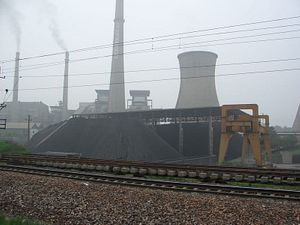China’s total carbon dioxide emissions dropped in 2014, the first year-on-year decline since 2001, Bloomberg reported on Friday. The news marks a potential turning point in China’s “war on pollution” and in global efforts to prevent climate change.
Using energy demand data from China’s National Bureau of Statistics, Bloomberg New Energy Finance estimates that China’s CO2 emissions dropped 2 percent in 2014 compared to 2013. That confirms recently released findings by the International Energy Agency, which found that changing energy consumption patterns in China were a major reason that global emissions remained flat in 2014.
Sophie Lu, an analyst for BNEF, pointed out a major cause of the emission drop — China’s “coal demand is slowing” while other energy sources are becoming more widely used. According to China’s National Energy Administration, coal represented 64.2 of China’s total energy matrix, down from 66 percent in 2013. The goal is to have China’s reliance on coal continue to decline, with a target of having coal represent only 62 percent of China’s energy usage by 2020. Some experts are even calling for a cap on coal to be included in the next Five Year Plan (to cover the period from 2016-2020). The move away from coal was reflected economically as well; as Sara Hsu pointed out for The Diplomat, China’s coal mining industry saw profits drop by 46 percent last year.
In recent years, China had only been willing to commit a reduction in “emissions intensity,” or the number of emissions per unit GDP. Given China’s rapid GDP growth over the past decade, even meeting goals for emissions intensity reductions did little to stop total emissions from skyrocketing. China’s goal for this year, for example, is to reduce carbon intensity by 3.1 percent. But in a breakthrough climate change action plan announced alongside U.S. commitments last November, China announced it would aim to have its total emissions peak by 2030.
China’s push to move away from coal and toward cleaner energy sources is already paying off. China invested just under $90 billion in renewable energy in 2014 (compared to $51.8 billion for the U.S., the next largest investor in the world). China is also more aggressively pursuing natural gas and other, cleaner energy solutions such as nuclear power. According to China’s Energy Development Strategy Action Plan, released last November, China wants 10 percent of its total energy use to be supplied by natural gas by 2020.
The fact that China’s total emissions actually dropped in 2015 is a welcome sign for environmentalists everywhere. Environmental experts in China and abroad say that Beijing must move up the date for its peak emissions from 2030 to 2025 if the worst effects of climate change are to be avoided. That goal seems much more achievable now that China has posted its first total emissions drop in nearly 15 years.































